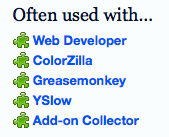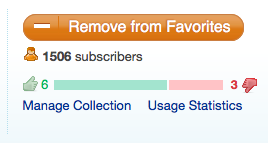We’ve just released AMO 5.0.9 with a ton of new features and bugfixes out into the wild. There’s something for everyone in this release, so take a look!
Add-on Recommendations
 Some things go great together: peanut butter and jelly, popcorn and movies, Firebug and YSlow. Starting today, when you’re looking at an add-on’s listing, you’ll see several other add-ons that are often used together. We base these recommendations on the add-ons our users have grouped together in collections.
Some things go great together: peanut butter and jelly, popcorn and movies, Firebug and YSlow. Starting today, when you’re looking at an add-on’s listing, you’ll see several other add-ons that are often used together. We base these recommendations on the add-ons our users have grouped together in collections.
Contributions
Last month we launched our Contributions pilot, a way for add-on authors to accept monetary donations from users of their add-ons. We’ve gotten great feedback from users and developers, and are now expanding the reach of contributions on AMO. Add-ons that have turned on Contributions will now have contribution boxes in search results and category browse listings, where many installations take place.

While these new boxes help surface the existence of contributions, some users aren’t likely to make a donation without first testing the add-on to ensure it’s useful to them. With this release, developers have a new way to accept donations after a user has tried the add-on by simply pointing users to their add-on’s new about page.
Collections
Since the launch of Collections in June, add-on fans have created almost 30,000 collections, resulting in more than 6.5 million add-on downloads. This release includes many new features to make Collections even more useful.
Logged-in users can now rate collections and sort by those ratings to help the best collections bubble to the top.

To help determine the popularity of a collection, authors can now access a collection statistics dashboard that shows information on the number of subscribers, ratings, and downloads over time.
We’ve also added a treat for users of browsers that support localStorage (including Firefox 3.5): recently viewed collections. When browsing through the collection directory, users can now easily get back to a collection they saw, without having to log in.
Public Stats
In early 2008, we gave add-on developers their first look at the shiny new Statistics Dashboard for each add-on hosted on AMO. Currently some dashboards are public and some are private, but we’ve never offered an in-depth look at the aggregate statistics for all add-ons hosted on AMO.
Today we’ve launched a detailed view of AMO as a whole, with data on add-ons, downloads, active users, users, reviews, and collections. Go on, check it out!
Add-on Validation
Earlier this month, we announced the arrival of the new add-on verification suite on AMO. At the time it was an optional tool developers could choose to run for their files. With this release, the tool will automatically be run when uploading a new file, and the results of the tests will affect the submission process. Editors will see the test results and any flags when reviewing the add-on. We hope to help developers catch common problems before an editor’s review.

We’d like to extend a huge thanks to the Web developers and testers who have contributed their time and talent to this release.
Wladimir Palant wrote on
wrote on
Ken Saunders wrote on
wrote on
Pino wrote on
wrote on
BobB wrote on
wrote on
Jason wrote on
wrote on
Wil Clouser wrote on
wrote on
Ken Saunders wrote on
wrote on
Matt wrote on
wrote on
ycc2106 wrote on
wrote on
Brett Zamir wrote on
wrote on
Brett Zamir wrote on
wrote on
Ken Saunders wrote on
wrote on
Brett Zamir wrote on
wrote on
Brett Zamir wrote on
wrote on
ravi wrote on
wrote on
Firefox User wrote on
wrote on